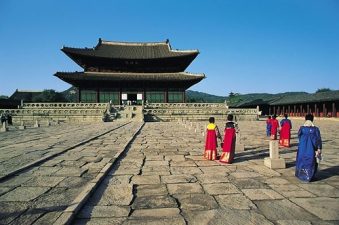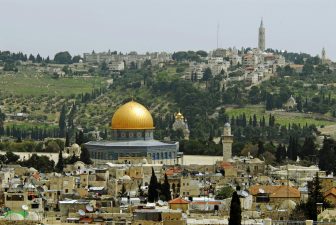 This graphic shows other ways to spend the $2.4 billion planned for what critics call Morocco’s luxury high speed rail project
This graphic shows other ways to spend the $2.4 billion planned for what critics call Morocco’s luxury high speed rail project
A group of Moroccan Non-Government Organizations have launched the Stop TGV campaign in protest of Morocco’s $2.4 billion high speed rail project. The TGV line is expected to link up Casablanca with Tangiers by the end of 2015, reducing travel time from 5h45 to 2h10. Proponents of the project say that it will boost the economy, improve tourism traffic, and have a trickle down effect through improved infrastructure and job creation, but critics claim that high speed rail is a luxury that Morocco can ill-afford.
Economic crime?
The 219 mile TGV rail link construction project was awarded to the French company Alstom in 2007. One blogger, Larbi, said the project is an economic crime designed to assuage French President Sarkozy’s hurt feelings over losing an arms contract to the United States, according to Global Voices Online.
In September, 2011 “At a ceremony chaired by King Mohammed VI of Morocco and President Sarkozy, the Moroccan Minister of Transport Karim Ghellab explained that the TGV is expected to generate new jobs and offer training opportunities in rail professions for Moroccan jobseekers,” writes GVO. But activists are not convinced.
The above graphic published in French by Stop TGV demonstrates how the $2.4 Billion planned expenditure could be better spent in a country that ranks second lowest in the region in terms of human development.
How to spend $2.4 billion
Here is a bulleted list of the projects in English, although we should point out that google translate is not always 100% accurate:
- 3,000 to 5,000 schools or high schools in urban areas
- 25,000 schools in rural areas
- 100 engineering colleges and 300 fully equipped technical training institutes
- 25 major university hospitals fully equipped with a total capacity of 22,000 beds
- 6,000 hectares of serviced industrial areas (36,000 industrial units)
- 16,000 community centers, libraries or community centers
- 10,000 media libraries
- 16,000 kilometers of rural roads
Last year we traveled through Morocco and found the country to be very accessible compared to other countries in the region. We were able to visit far flung parts of the country via bus or rail, even if these trips sometimes took a long time.
But we also noticed that sewage facilities in populated tourist areas, not to mention rural areas, were in need of serious attention, and the communication infrastructure was very poor – even in Casablanca, which is the business capital of the country.
Education, education, education
And although the Berbers are able to speak many different languages as a result of their contact with tourists, most receive a religious Islamic education that inadequately prepares them for the challenges of the modern world.
Ismail Tahiri, Editor of the Tangiers newspaper Fadaa al-Boughaz, told Construction Shows that the TGV Morocco might reduce travel times for businessman, but that money would be better spent improving education, health, and infrastructural facilities.
He notes that “30% of the country’s residents are illiterate, 2 million students quit school each year, and the country ranks 106th out of 128 on UNESCO’s list of educational development.”
Do you think that Morocco should spend this money on high speed rail, or should the government build more schools?
:: Stop TGV
More on Tourism and Development in Morocco:
Rocking the “Eco” Kasbah du Toubkal in Morocco
Morocco’s Berbers Had Water Management Sorted
Moroccan Love Potion Spiced With Pot – Make it!




Tafline, sorry but from where did you infer any allusion to perpetual economic growth? Morocco’s development in every field, of every sort, is undeniable, including environmentally. Cynical attempts to undermine this by NGOs and international bodies alike are probably more reflective of the ulterior motives and corruption that dominates world politics. Be mindful.
http://books.google.co.uk/books?id=5V77mdCXHJcC&pg=PA181
Omar, ask yourself.
http://www.dummies.com/how-to/content/dangerous-levels-of-euro-debt-portugal-ireland-gre.html
Please ask yourself why high speed train projets have been stoped or posponed ni so Manu countries that are richer then Morocco (Spain, Portugal, Argentina,…)?
Thanks for your comments, but both of them assume that the perpetual economic growth model is best for Morocco when everywhere else in the world this kind of growth has shown itself to be both environmentally and socially corrosive.
The people advocating the end of the TGV are the same advocating against the Mawazine Music festival, and against a number of other projects and events. The fact of the matter, is that these people have an extremely narrow and erroneous view of how economic development occurs. Just like you don’t cure Africa’s poverty problem through humanitarian aid, you can’t solve the crisis just by building more schools if there are no jobs to be had. I’m the biggest proponent of education, but these people don’t seem to understand either that France is one of our biggest trading partners, and that trade implies a two-way relationship. That 2.4 billion dollars is not just cash that was sitting in the coffers, its financing that was given specifically for this project. You can’t simply reallocate that towards other things, because then the financing ceases to exist.
Morocco should continue with the TGV; this investment will in fact open more doors to foreign investments, which in turn will give Morocco MORE MONEY TO open schools and other social projects. Proof, it’s not just pure chance that Renault opened one of the biggest auto plants in Morocco (Tangier region)You take and give; it’s pure business, and I salute the decision to have a TGV. England last month voted to extend its high speed train network for one reason, not to let Morocco HAVE a larger network by 2015. So sometimes this is just PR at work, Good Job Morocco–that’s how to attract foreign investors and even retirees to buy property in sunny Morocco.